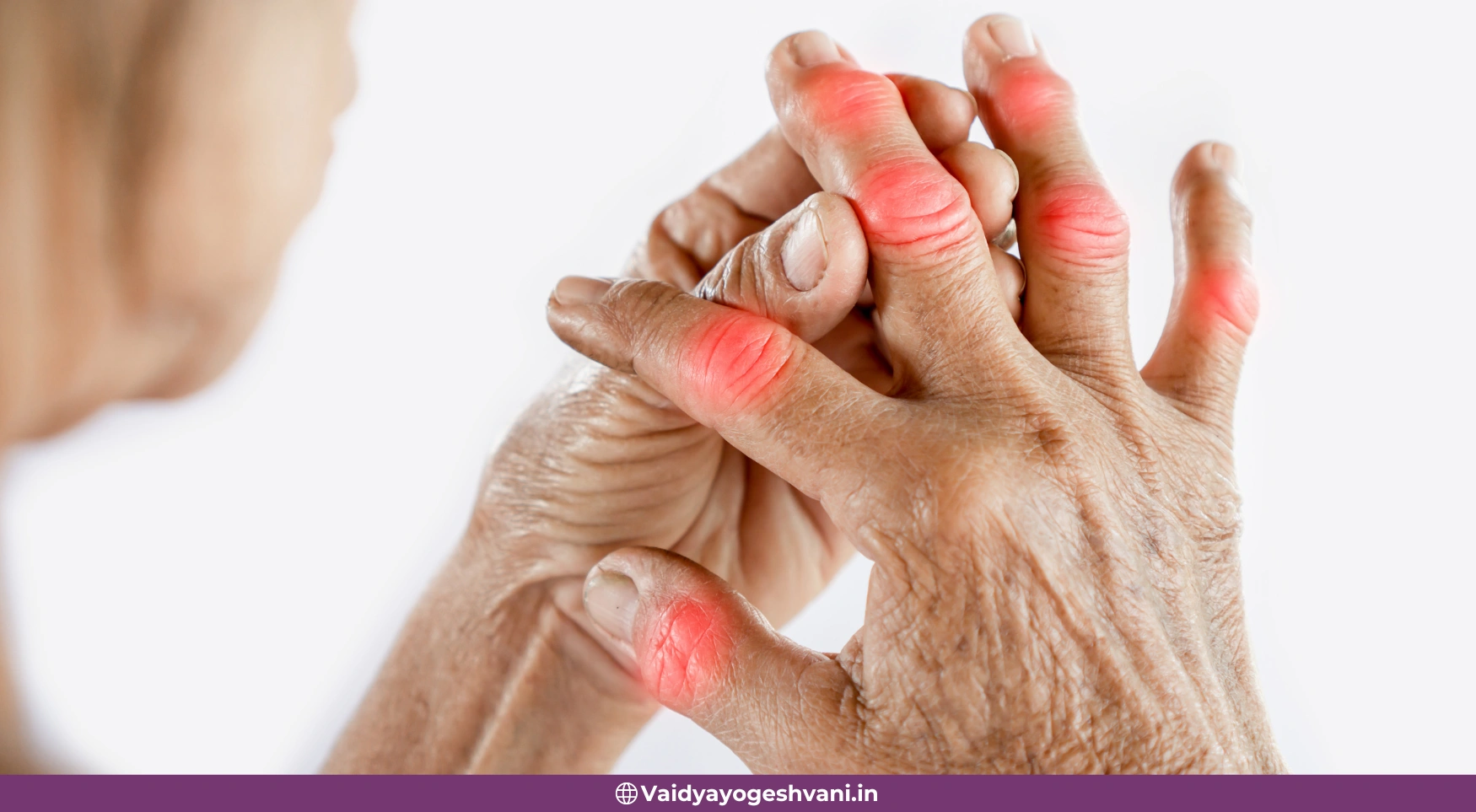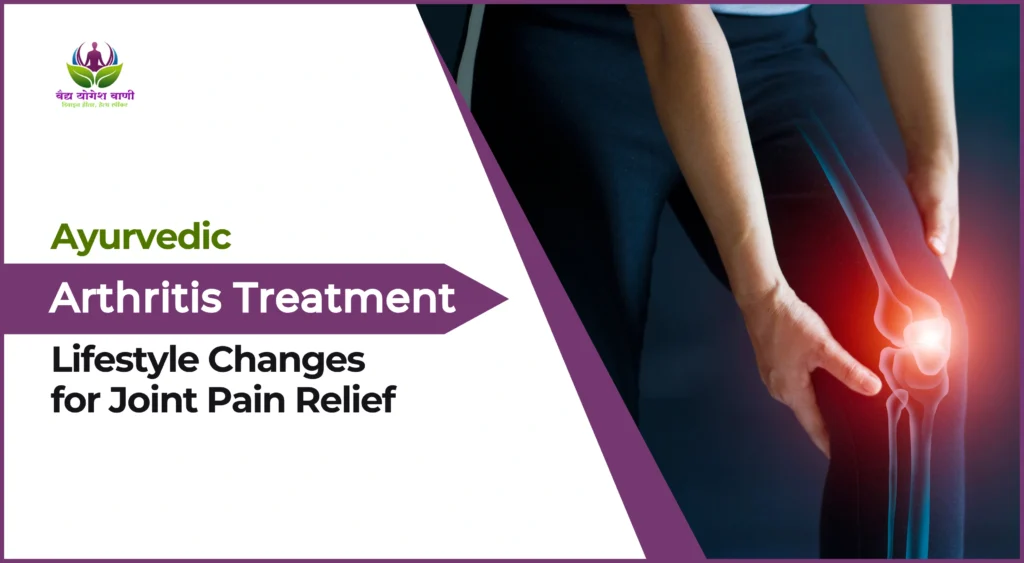Table of Contents
ToggleArthritis affects many people worldwide in various ways. The condition causes pain, swelling, and stiffness. This makes daily activities difficult. People prefer to take medications to treat arthritis. Natural treatment methods have the potential to make a big difference in this condition.
The condition causes inflammation in the joints, resulting in limited mobility. This treatment includes herbal remedies, dietary changes, massage therapy, and lifestyle changes. These methods work together to restore balance.
In this blog, we will discuss Ayurvedic arthritis treatment that can change your lifestyle.
Ayurvedic Arthritis Treatment That Can Change Lifestyle
According to Ayurvedic Arthritis Treatment, performing daily minor activities will maintain joint health. The combination of different herbal treatments produces an effective solution for arthritis pain and joint stiffness.
Balanced Diet for Joint Health
Food quickly affects arthritis management. A proper diet helps lower inflammation while building strong bones and joints. Warm foods that are easy to digest serve as the best choice according to Ayurveda. The products function to decrease vata, which produces joint pain and Arthritis stiffness. According to Ayurveda, your daily food choices determine the health of your joints. The body benefits from this process because it generates energy while building up its defense system against diseases.
- Add anti-inflammatory spices to your meals: The combination of turmeric, ginger, and garlic functions to lower inflammation in the body. These products help people with their joint stiffness.
- Include fresh vegetables and fruits in your daily diet: The first step is to test greens and carrots, berries, and citrus fruits. The foods contain essential vitamins together with antioxidants. These maintain your joint strength.
- Choose whole grains together with legumes: The combination of brown rice with oats and lentils delivers both nutritional value and digestive support. According to Ayurveda, proper digestion leads to healthy joints.
- Avoid processed and oily foods: The combination of hot and cold snacks with processed foods and extremely cold beverages creates body stiffness, which interferes with normal digestion.
Daily Exercise and Yoga
Movement is extreme in the management of magnified arthritis pain. The modern world and Indian medicine agree: gentle exercise builds muscle and improves joint flexibility. When joints become stiff, they lose their function. In these exercises, the body stays active with little strain on weak joints. Yoga is one option.
- Try gentle yoga poses: Simple postures help increase flexibility and reduce stiffness. Examples are cat-cow stretches, child’s pose, and seated forward bend.
- Take regular walks: Walking helps blood flow in the joints, keeping them flexible. Twenty minutes of walking may bring disc relief and a reduction in pain.
- Try low-impact exercises: Swimming, biking, and short stretches are great options. They help support your joints by using stronger muscles.
- Perform stretches that are gentle on the joints: Daily light stretches for your shoulders, wrists, knees, and ankles help keep your joints flexible. They also reduce early stiffness.
Stress and Sleep Management
In Ayurveda, stress is supposed to increase the intensity of pain. Sleep deprivation worsens an already existing pain symptom. Stress hormones trigger mental restlessness, ultimately leading to more joint inflammation in the body. The ancient art of healing in Ayurveda guides one toward mental peace by having the person meditate in conjunction with certain breathing techniques and proper sleep patterns. All three of these activate your body towards healing itself. More rest means less joint pain or, should there be new pain, relief.
- Breathe and meditate: Take deep breaths or meditate for a bit. This helps to clear your mind and relax your muscles.
- Stick to a sleep schedule: Pick regular times for going to bed and waking up. This helps improve sleep quality and boosts your energy.
- No screens before bed: If your phone or TV disrupts your routine, it can throw off your entire schedule. Thus, staying away from these will aid in relaxation.

Ayurvedic Therapies and Oils
The Ayurveda system provides multiple external treatment methods that help treat arthritis. The treatments involve the use of oil massages together with herbal remedies. These treatments help people find relief from their pain. The techniques help improve vein treatment for blood circulation, and decrease body tightness while making energy distribution more equal. Ayurvedic treatment helps joints become more flexible through consistent application of its methods. Your lifestyle choices will generate better health results.
- Warm Oil Massage (Abhyanga): This massage uses warm sesame or herbal oils. It helps relax tight muscles and eases pain.
- Steam therapy (Swedana): This therapy functions through the application of delicate herbal steam. The treatment works to open skin pores while improving joint circulation and reducing joint stiffness.
- Local oil applications: Medicated oils can help you feel better and move more easily.
Other Ayurvedic Treatments for Arthritis
According to Ayurveda, a wide range of safe approaches can help joint health. The first step in patient treatment requires healthcare professionals to grasp how inflammation, toxins, and body imbalances operate. The program provides arthritis relief to clients when they receive adequate care and proper direction.
- Herbal Remedies
- Turmeric (Curcumin): The active compounds in turmeric produce strong anti-inflammatory effects, which decrease joint inflammation.
- Boswellia (Shallaki): The herb serves as an ancient Ayurvedic therapeutic that promotes better joint movement while protecting against joint stiffness.
- Ashwagandha: The herb Ashwagandha improves muscle power while decreasing stress levels, yet these effects could potentially make arthritis symptoms worse.
- Guggul: Guggul reduces pain and inflammation. It also boosts mobility.
- Ayurvedic Decoctions (Kashayams): Rasnadi Kashayam and Dashmoolarishta represent herbal decoctions that function to regulate vata and mitigate pain symptoms.
- External Poultices (Lepa): The treatment of swollen joints involves applying herbal pastes, which doctors recommend to their patients. The method helps to decrease inflammation while providing relief in the affected area.
- Dietary Supplements: The combination of Ashwagandha-arishta with medicated ghee serves to enhance bone strength while providing joint lubrication.
- Detox Therapies: The treatment plan includes distinctive Panchakarma therapy sessions. Virechana functions as a purgation therapy, but Basti serves as an herbal enema treatment. The therapies focus on removing toxins, which Ayurveda connects to the development.
Conclusion
Arthritis is a permanent condition that makes the joints hurt and be stiff, plus the movement gets limited. The Ayurvedic method of treatment gives a natural way of healing with the help of herbal formulas that regulate body energies, facilitate the digestive process, and also in inflammation and strengthen joints.
The main therapies are oil massage and herbal medicines that help in anxiety relief and also make the body more flexible. A good lifestyle is very important—weight control, physical activity, and stress management are major factors that benefit the joints. Good sleep and regular daily activities help in recovery and good health.
An appointment with a doctor before Ayurvedic or herbal treatment is a must to guarantee safety. The pain can be lessened, mobility increased, and the quality of life of the arthritis patients improved when Ayurveda, modern healthcare, and a healthy lifestyle are used together.
Frequently Asked Questions
How long does it take to see results with lifestyle changes?
Some people may feel better in a handful of weeks, while regular progression of recovery can take a good number of months.
Should I stop my medicines if I follow Ayurveda?
No, medicines need not be stopped for any reason without the physician’s consent. Ayurveda can be combined with standard care.
Will a lifestyle change reduce or replace medical treatment?
If lifestyle changes are the best aid to promote joint health, however, they should never be considered enough to replace medical treatment without the consent of a physician.
Are Ayurvedic treatments safe for all?
For the most part, yes, but some herbs may not be suitable for those with other health issues or those who are on certain medicines; therefore, one ought to consult a doctor first.



